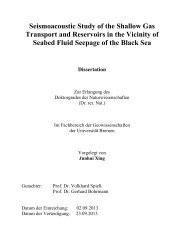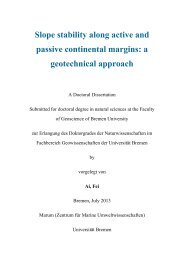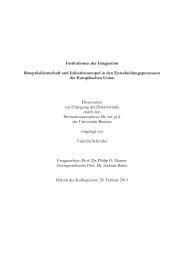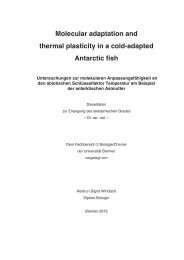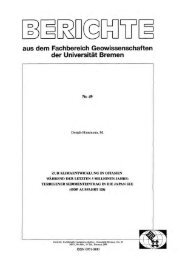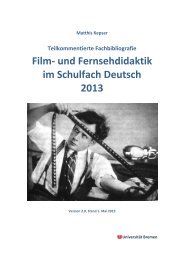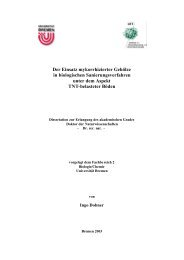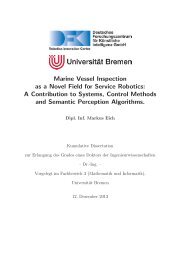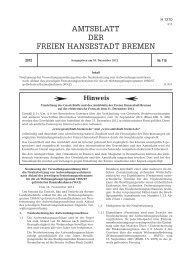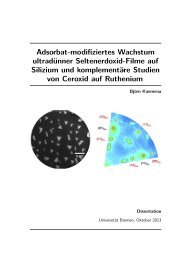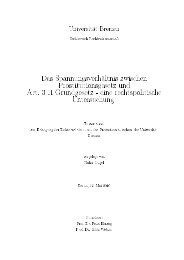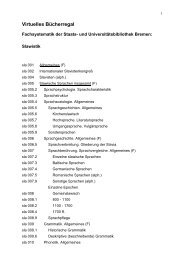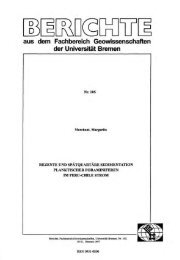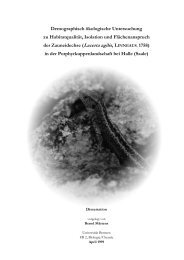Hiske Gesine Fink - E-LIB - Universität Bremen
Hiske Gesine Fink - E-LIB - Universität Bremen
Hiske Gesine Fink - E-LIB - Universität Bremen
You also want an ePaper? Increase the reach of your titles
YUMPU automatically turns print PDFs into web optimized ePapers that Google loves.
� ���������������������������������������������������������<br />
8 Development�of�Mediterranean�cold�water�coral�ecosystems�since�the�late�<br />
glacial:�A�comparative�study�between�the�western�and�eastern�sub�basins�<br />
<strong>Hiske</strong>�G.�<strong>Fink</strong>���������������������������������������������������������������� �<br />
1MARUM���Center�for�Marine�Environmental�Sciences,�University�of�<strong>Bremen</strong>,�Leobener�Strasse,�28359�<strong>Bremen</strong>,�Germany�<br />
2Earth�System�Science�Department,�B321�Croul�Hall,�University�of�California,�Irvine,�California�92697,�USA�<br />
3present�address:�Departamento�de�Oceanografía,�Universidad�de�Concepción,�Barrio�Universitario�s/n,�Chile�<br />
�<br />
�������������������Earth�and�Planetary�Science�Letters��<br />
�<br />
By�compiling�all�available�ages�of�the�dominant�framework�building�scleractinian�cold�<br />
water� coral� species� Lophelia� pertusa� and�Madrepora� oculata� since� the� last� glacial� from�<br />
literature� review� and� own� studies,� distinct� spatial� and� temporal� differences� between� the�<br />
eastern� and� western� Mediterranean� sub�basins� appear.� During� the� last� glacial� period,� the�<br />
entire� Mediterranean� Sea� was� characterised� by� scarce� cold�water� coral� colonisation� before�<br />
they� became� abundant� during� the� deglacial� after� ~14�ka.� Whereas� in� the� western�<br />
Mediterranean� Sea� the� initial� deglacial� cold�water� coral� growth� was� forced� by� increased�<br />
primary� production� and� well� ventilated� intermediate� water� masses� prevailing� during� the�<br />
formation�of�the�so�called�organic�rich�layer�1�(ORL1,�~14.5�to�8.2�ka),�favourable�conditions�<br />
for� cold�water� corals� in� the� eastern� basin� were� established� only� during� the� Younger� Dryas�<br />
(YD,� 12.9� to� 11.7� ka).� However,� in� the� Alboran� Sea,� as� the� westernmost� part� of� the�<br />
Mediterranean� Sea,� the� YD� is� characterised� by� an� absence� of� cold�water� corals� induced� by�<br />
enhanced� inflow� of� Atlantic� waters� during� this� cold� event,� which� led� to� environmental�<br />
instabilities.� During� the� deposition� of� sapropel� S1� in� the� deep� eastern� Mediterranean� Sea,�<br />
dysoxic�conditions�prevailing�in�intermediate�water�depths�caused�a�temporal�coral�demise�in�<br />
this� basin� (~11.5� to� 5.9� ka).� Moreover,� the� impaired� formation� of� both,� Levantine�<br />
Intermediate�Water�(LIW)�in�the�east�(during�S1�deposition)�and�Winter�Intermediate�Water�<br />
in� the� west� (after� ORL1� deposition),� had� a� negative� impact� on� the� prosperity� of� western�<br />
Mediterranean� coral� ecosystems� during� the� Mid� Holocene.� Along� with� the� onset� of� LIW�<br />
formation�(~�6�ka)�cold�water�corals�re�colonised�the�entire�Mediterranean�Sea�and�thrived�<br />
there�throughout�the�Late�Holocene�until�today.��<br />
�<br />
Keywords:�������������������������������������������������������������������������������<br />
��� �������������<br />
����������� ������� ���� ������� ������������<br />
������ ���� �������� ������������ ��������� ���� ����<br />
����� ���������� �������������������<br />
�������������� ������ �������� Lophelia� pertusa�����<br />
Madrepora� oculata� ���� ��� ���������� ����������<br />
����������� ���� ��� ���� ����� ������������� ��������<br />
����������������������������������Roberts�et�al.,�<br />
2006����������������������������������������������<br />
�������������������������������������������������<br />
������ ��� �������� ����������� ��� ������� ���<br />
����������� ���� ������� �Freiwald� et� al.,� 1997;�<br />
Fosså� et� al.,� 2005��� ��� ������ ������ ������� ���<br />
� � ���



